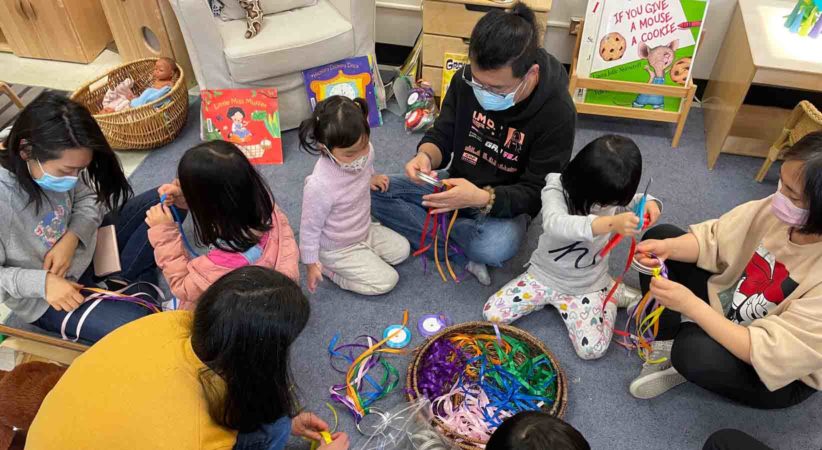
IPALS thrives despite challenges
In March, about 30 literacy workers from across BC met on Zoom to debrief and celebrate the year’s Parents as Literacy Supporters in Immigrant communities (IPALS) program successes and learn from their peers.
IPALS is a program that helps immigrant and refugee families build confidence and connections before they enter a Canadian kindergarten classroom.
This year, Decoda Literacy Solutions supported 18 IPALS programs, serving immigrant communities in the Lower Mainland, Kelowna, Nanaimo and Victoria, with Surrey expanding its program to two additional locations.
“Another year of uncertainty and stress forced us to be more innovative and resilient,” Aliza Dhungana, IPALS program manager at Decoda Literacy Solutions. “Despite so many challenges, you all worked very hard and had successful IPALS programs.”
More than 300 families learned new strategies to support their child’s learning in fun and interactive ways, while responding to their cultural and linguistic needs.
During the debrief, Decoda reflected on the IPALS program and discussed the year’s challenges and identified ways to improve future programs.
Challenges overcome
COVID-19 proved the biggest challenge in delivering IPALS programs. It meant planning safe in-person sessions, adapting to virtual sessions, learning new technology and supporting families in new ways. It also created staff shortages.
Facilitators were dedicated and creative as they adapted programs to include virtual sessions. They felt well supported by Decoda program manager Aliza Dhungana and used Decoda’s IPALS Virtual Sessions Guide to prepare for online programs.
The BC floods, heat dome and cold snap also created unexpected challenges to participation as families dealt with immediate safety priorities. And yet, some programs had to turn families away because they were at full capacity.
“It was my favourite year!” said Angela Yodogawa, IPALS facilitator in the Richmond School District. “We had all in-class sessions and got to know our families well. We found that small groups worked better, so we had two sessions of 10 families each.”
Working through the challenges, IPALS facilitators identified promising practices they can incorporate in the coming year, such as including STEAM in family activities, using technology in a variety of new ways and using materials that are readily available at home.
Tying in the Early Learning Framework
The group also had an introduction to the updated BC Early Learning Framework presented by Deanna DeVita, member of the Early Learning Framework Advisory Group, early childhood educator and IPALS facilitator at Hollyburn StrongStart in West Vancouver. It’s a helpful supporting tool for early learning with a vision of “respectfully living and learning together.”
“The Early Learning Framework is intended to inspire – it’s not a manual to tell you how to do things,” Deanna said. “It’s a general overview with a focus on how we might use the Early Learning Framework to guide our practice in our work as IPALS facilitators.”
The presentation highlighted that every reader will use the framework in a way that suits them best. It is intended to be lived with over time, to be reflected on in collaboration with others, and to inspire educators to stop and think about why they practice in particular ways.
Deanna recommends reading the full Early Learning Framework document or taking the free online course Introducing the Early Learning Framework.
Encouraging active participation and learning through play
Lillian Kocmaruk, of the Burnaby School District, presented Ways to Encourage Active Participation and Learning Through Play. Lillian admits to being hesitant about moving to virtual programs initially but with patience and perseverance, she found that the adapted IPALS program thrived.
“Families really appreciated our ready-made activities,” she said. “We saw an increase in growth, participation and joy! The whole family benefits from the program, and they learn that literacy happens everywhere.”
Her tips to facilitate program delivery included creating bilingual booklets with key ideas and activities, LEAP cards and a sing-along book. Lillian pointed out that newcomer families often don’t have many resources, so they also provided extra materials for crafts, play, counting and other activities.
With all these new tips and resources, IPALS programs will begin again in September 2022.
For more information about Parents As Literacy Supporters, visit the Decoda Literacy Solutions website or contact program manager Aliza Dhungana at adhungana@decoda.ca.
Decoda Literacy Solutions acknowledges the support of Immigration, Refugees and Citizenship Canada.
About us
Decoda Literacy Solutions is BC’s provincial literacy organization. We support community-based literacy programs and initiatives in over 400 communities across BC by providing resources, training and funds.
Our work supports children and families, youth, adults, Indigenous and immigrant communities to help build strong individuals, strong families and strong communities.
Related Blog Posts
Long-time literacy practitioner values Decoda’s collaboration and support
The Director of Literacy Quesnel discusses how Decoda supports community literacy.
Past editor celebrates The Westcoast Reader’s 40 years
Past editor Joan Acosta talks about The Westcoast Reader’s 40-year success.
Our path forward
Decoda’s 2022-2025 strategic plan focuses on literacy advocacy, leadership and sustainability.
